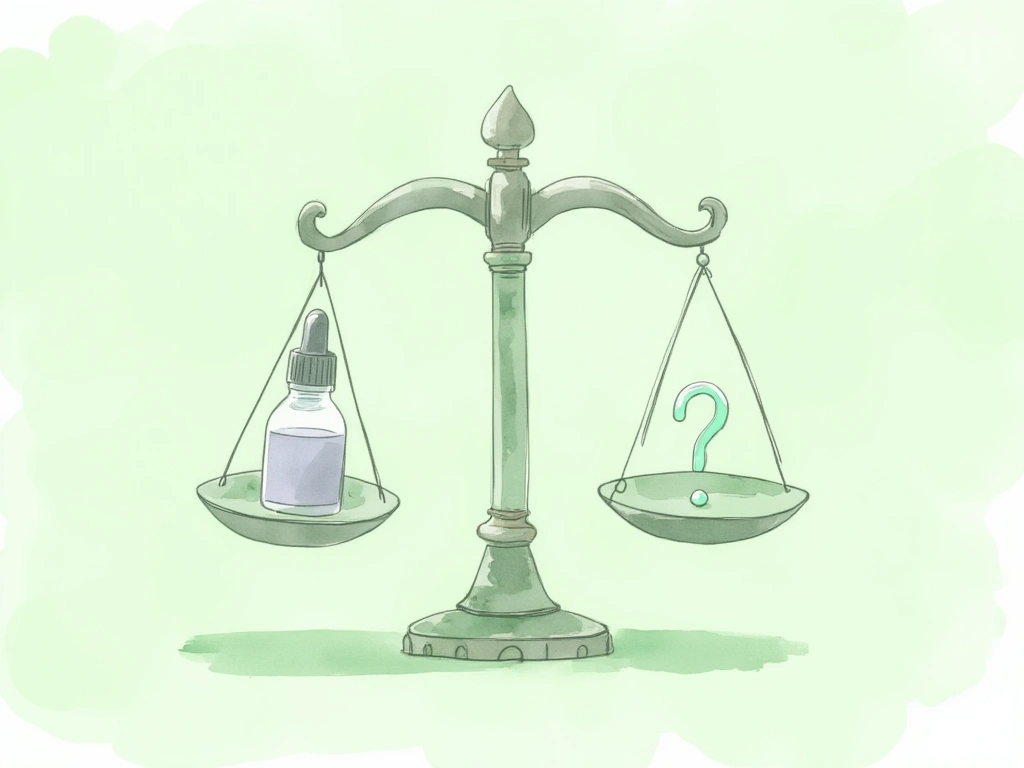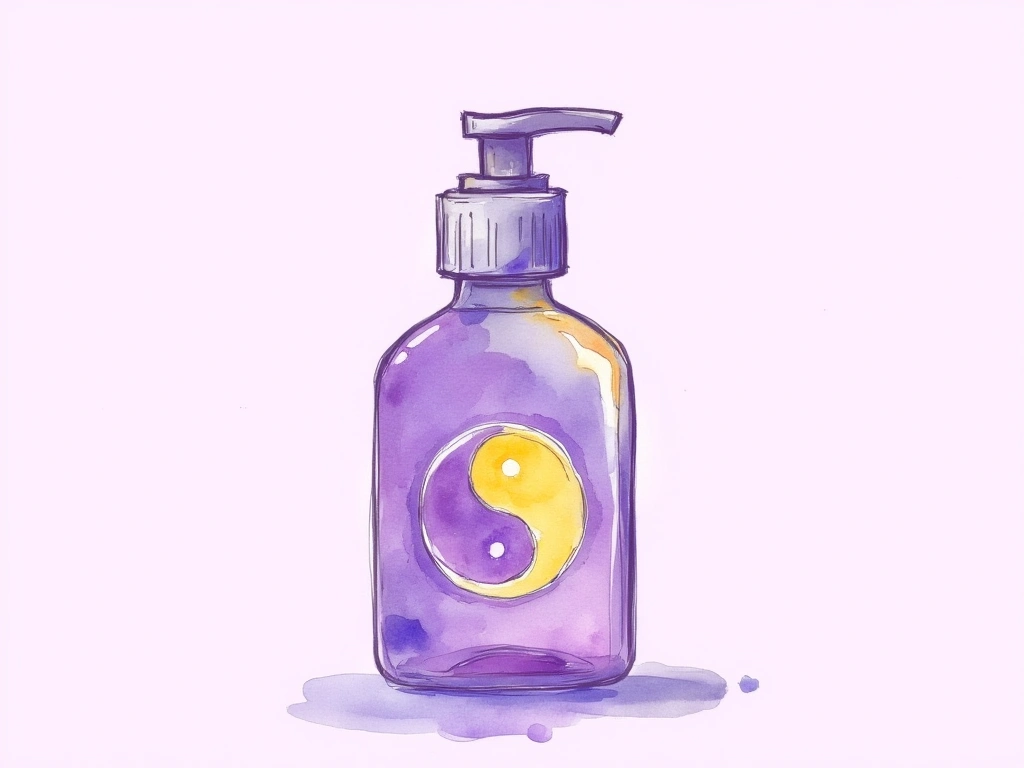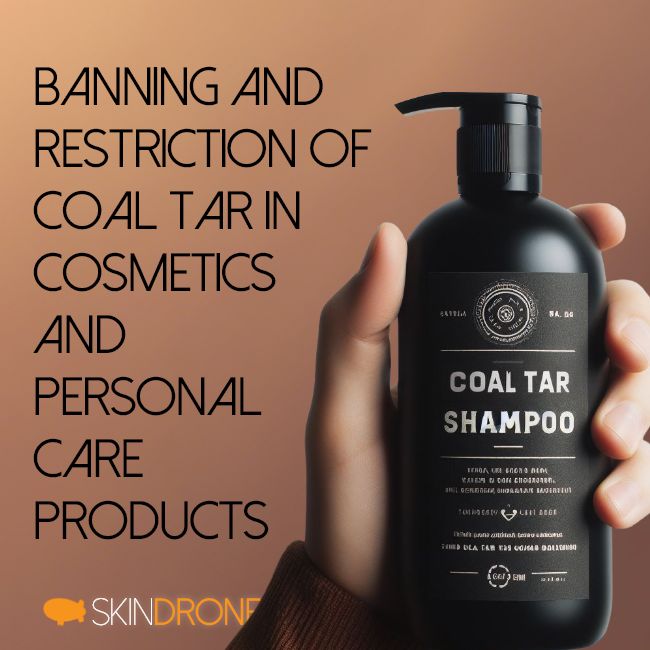This article summarizes the evidence behind these bans and restrictions in Europe, Canada, and the United States.
TLRD: Coal tar, a common ingredient in cosmetics, is facing restrictions in Europe, Canada, and the US due to concerns about its potential carcinogenicity. Despite evidence linking it to increased cancer risk, medically supervised treatments are still permitted.

Introduction
Coal tar contains high levels of polycyclic aromatic hydrocarbons (PAHs), which have been shown to cause cancer in animal studies when applied to the skin over long periods [1]. There is also some evidence linking topical coal tar use in humans to increased skin cancer risk [2,3]. However, the data is limited, especially for medically supervised coal tar treatments for skin conditions like psoriasis.
Nonetheless, many countries have imposed general bans or restrictions on coal tar in consumer cosmetic products as a precautionary measure against long-term daily topical exposure. At the same time, controlled medical uses of coal tar are still permitted in many cases under regulation as a prescription drug. This paper summarizes coal tar regulations and the rationale behind them in Europe, Canada, and the United States.

Evidence for Banning and Restricting Coal Tar
Multiple lines of evidence suggest coal tar is carcinogenic when applied topically:
- Animal studies show topical coal tar causes cancer in mice and rabbits [1].
-
Case reports link prolonged consumer use of topical tar preparations to increased skin cancer risk in humans [2].
-
Workers exposed to coal tar products have higher rates of cancer [4].
However, evidence directly linking medically supervised topical coal tar treatment for skin conditions to increased cancer risk is lacking:
- No definitive link shown between using topical coal tar to treat psoriasis under medical direction and increased skin cancer risk [9,10].
-
But, topical application results in some absorption and internal exposure to carcinogenic PAHs. This raises concerns about potential increased risk for internal cancers [7,8].
In summary, while coal tar is likely carcinogenic with chronic topical exposure, more research is needed on cancer risks with properly controlled medical uses.

Regulations in Europe
The European Union has banned or limited coal tar dyes and derivatives in cosmetics under the EU Cosmetics Regulation and Classification, Labelling and Packaging (CLP) Regulation [5,6].
The regulations appear intended as general precautions to limit long-term topical exposure from daily consumer use of cosmetics containing coal tar. They do not seem to specifically target medically supervised coal tar treatments.

Regulations in Canada
Canada has prohibited certain coal tar dyes and restricted other coal tar derivatives in cosmetics sold to consumers [7]. Coal tar is regulated as a prescription drug for medical uses like medicated shampoos. This allows additional safety testing and labelling not required for cosmetics [8].
As in Europe, the regulations are likely meant as general precautions rather than targeting medically controlled coal tar treatments. Further research on carcinogenic risks from properly monitored medical coal tar uses could inform future regulations.

Regulations in the United States
In the United States, the Food and Drug Administration (FDA) regulates cosmetics and sets restrictions on ingredients like coal tar [9]. The FDA prohibits high concentrations of coal tar in cosmetic products marketed to the general public [10]. However, low concentration coal tar solutions can be sold over-the-counter as therapeutic products for skin conditions under FDA monograph regulations [11].
Additionally, high concentration prescription coal tar products are permitted under medical supervision for treating diagnosed skin disorders [12]. This regulatory approach seems intended to limit general exposure from cosmetics, while allowing controlled medical access for skin disease treatment. More safety data could help guide optimal US regulations.

Conclusion
While evidence suggests topical coal tar is carcinogenic with chronic exposure, data directly linking medically supervised treatments to increased cancer risk is lacking.
General coal tar bans and restrictions in consumer cosmetics limit widespread exposure. However, controlled medical uses of coal tar are still permitted in many countries under drug regulations.
Further research clarifying cancer risks, especially with proper medical oversight, could help inform optimized regulations balancing safety and treatment benefits.

References
- Huff J. Long-term chemical carcinogenesis bioassays predict cancer hazards. Ann NY Acad Sci. 1999;895:56-79.
- Zackheim HS. Should therapeutic coal tar preparations be available over-the-counter? Arch Dermatol. 1978;114:125-6.
- Rook AJ, et al. Squamous epithelioma possibly induced by therapeutic applications of tar. Br J Cancer. 1956;10:17-23.
- Tremblay C, et al. Estimation of risk of developing bladder cancer among workers exposed to coal tar pitch volatiles in the primary aluminum industry. Am J Ind Med. 1995;27:335-48.
- SCCS (Scientific Committee on Consumer Safety). Opinion on coal tar pitch, high temperature. 2018;1657.
- European Chemicals Agency. Coal tar pitch, high temperature. Report No.: CLP-INV-251328-92-01/F.
- Government of Canada. Cosmetic Ingredient Hotlist: Prohibited and restricted ingredients.
- Government of Canada. Drug Product Database.
- US Food and Drug Administration. Authority over cosmetics.
- US Food and Drug Administration. Frequency of use of cosmetic ingredients.
- US Food and Drug Administration. CFR – Code of Federal Regulations Title 21.
- US Food and Drug Administration. Prescription coal tar drug products for the treatment of dandruff, seborrheic dermatitis, and psoriasis drug products containing coal tar.

Coal Tar: Balancing Benefits and Cancer Concerns in Cosmetics
For decades, coal tar has been a common ingredient in various personal care products, lauded for its effectiveness in treating dandruff, psoriasis, and other skin conditions. Shampoos, soaps, and creams often contained this substance, leveraging its anti-inflammatory and anti-dandruff qualities. However, mounting concerns about coal tar’s potential carcinogenic effects have led to significant restrictions and bans in many countries.
This article delves into the regulations surrounding coal tar in cosmetics across Europe, Canada, and the United States. We’ll explore the scientific evidence that prompted these restrictions, differentiate between cosmetic and medical applications, and discuss the ongoing debate about safety versus therapeutic benefits.
In a nutshell: Coal tar, historically used in cosmetics for its skin benefits, is now restricted in Europe, Canada, and the US due to potential cancer risks. While concerns exist about its safety in everyday cosmetics, medically supervised treatments remain an accepted option.

The Evidence: Why are Coal Tar Restrictions in Place?
The primary driver behind the restrictions on coal tar is its composition. Coal tar naturally contains high concentrations of polycyclic aromatic hydrocarbons (PAHs). These PAHs are the source of concern, as scientific studies have indicated their potential to cause cancer.
Here’s a breakdown of the evidence:
- Animal Studies: Research has consistently demonstrated that topical application of coal tar can induce cancer in animals like mice and rabbits [1].
- Human Case Reports: Some case studies have linked prolonged use of coal tar preparations by consumers to an increased risk of skin cancer [2].
- Occupational Exposure: Workers with regular exposure to coal tar products have shown higher incidences of cancer [4].
It’s important to note that while the evidence points towards a carcinogenic potential with chronic topical exposure, the picture is less clear regarding medically supervised treatments.
- Medical Treatments and Cancer Risk: Currently, there’s no definitive evidence directly linking medically supervised coal tar treatments for conditions like psoriasis to a heightened risk of skin cancer [9,10].
- Systemic Exposure Concerns: Even with topical application, some absorption of carcinogenic PAHs into the body occurs [7,8]. This raises questions about potential risks for internal cancers with long-term use, even in medical contexts.
In conclusion, the scientific community largely agrees that long-term, repeated exposure to coal tar carries a carcinogenic risk. However, more research is needed to fully understand the risks associated with controlled medical applications.

Coal Tar Regulations: A Global Snapshot
Different regions have adopted varying approaches to regulating coal tar, primarily focusing on consumer cosmetics while often allowing medical use under specific controls.
European Union: Strict Limits on Coal Tar in Cosmetics
The European Union enforces stringent regulations on coal tar through the EU Cosmetics Regulation and the Classification, Labelling and Packaging (CLP) Regulation [5,6]. These regulations effectively ban or severely limit the use of coal tar dyes and derivatives in cosmetic products available to consumers.
The EU’s approach is largely precautionary, aiming to minimize long-term, widespread exposure to coal tar from daily cosmetic use. Critically, these regulations are designed to control general consumer exposure and do not appear to impede medically supervised coal tar treatments prescribed by healthcare professionals.
Canada: Differentiating Cosmetic vs. Medical Use
Canada follows a similar path, prohibiting certain coal tar dyes and restricting other coal tar derivatives in cosmetics sold to the public [7]. However, Canada regulates coal tar as a prescription drug when used for medical purposes, such as in medicated shampoos. This classification as a drug allows for stricter control, including mandatory safety testing and specific labeling requirements that are not imposed on cosmetics [8].
Similar to the EU, Canadian regulations seem to be primarily focused on preventing widespread exposure through cosmetics, while maintaining access to coal tar for legitimate medical treatments under appropriate supervision.
United States: Balancing Access and Safety with FDA Regulations
In the United States, the Food and Drug Administration (FDA) oversees the safety of cosmetics and implements restrictions on ingredients like coal tar [9]. The FDA prohibits high concentrations of coal tar in over-the-counter cosmetic products marketed to the general public [10].
However, the FDA permits low concentrations of coal tar in over-the-counter (OTC) therapeutic products designed to treat skin conditions. These are regulated under FDA monograph regulations [11]. Furthermore, prescription-strength coal tar products, containing higher concentrations, are allowed for the treatment of diagnosed skin disorders under medical supervision [12].
The US regulatory framework aims to strike a balance. It limits general public exposure to coal tar through cosmetics while ensuring that individuals can still access its therapeutic benefits for skin conditions, either through OTC low-concentration products or prescription medications when deemed necessary by a doctor.


No Comments
Be the first to start a conversation